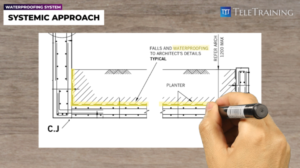Why is Technical Training for Site Crew a Necessity, not a Luxury?
Our site crews are responsible for turning our plans on paper into physical buildings, ensuring that all work is carried out safely, efficiently, and according to plans and specifications. While not required to be engineers, they must possess a certain level of technical knowledge, including an understanding of basic engineering principles like how to read structural drawings, common site practices and what can go wrong on site.

Having technical knowledge allows site crews to ask the right questions and challenge subcontractors, when necessary, without being experts in the field. By identifying potential problems early on, such as inadequate drainage or falls in the case of waterproofing works, site crews can work collaboratively with subcontractors to find solutions that meet project requirements and prevent future defects.

For site crews to effectively raise relevant questions, they must possess a foundational level of technical knowledge regarding the common tasks performed on-site, including groundworks, concrete and steel structures, waterproofing, facade, passive fire, and more. This knowledge enables them to identify potential problems and engage in constructive discussions with subcontractors to achieve optimal project outcomes.

To address the issue, our initial step is to determine the magnitude of the knowledge gap in question.
To answer this question, we have gathered data from an assessment and survey conducted among more than 500 individuals who have completed our technical training.
Our training courses were attended by individuals in various roles, including site engineers, project engineers, project managers, design managers etc. Attendees had varying levels of industry experience, ranging from as little as one month to over 20 years.
Given our target audience, we administered a multiple-choice assessment comprising 10 questions, both prior to and after the training program. The questions were customized to the specific training topic but focused on technical knowledge and the underlying reasons for common site practices or detailing methods.

The results were striking, as attendees answered an average of only 50% of questions correctly across all of our training programs. This highlights the critical importance of technical training for construction crews, as a 50% knowledge gap for fundamental site practices and basics is quite significant.
Now, the key question now is how effective technical training is in enhancing the competence of the site crew.
We measured the effectiveness of our training by administering the same questionnaire after the training, and the average score improved to 88%. This indicates a significant reduction in the technical knowledge gap.
To further solidate this data, we conducted a survey and asked attendees to rate how much their confidence had increased in identifying issues on-site. More than 80% of attendees reported that their confidence had either greatly or fairly increased.
This percentage was notably higher for certain training programs, particularly those focused on steel structures. Given that the amount of steel works is typically less than concrete, on-the-job learning opportunities are limited. This underscores the importance of such technical training before commencing the job.

Our corporate training course provides builders with a comprehensive understanding of design and construction principles, enabling them to identify potential issues, ask right questions, and work collaboratively with subcontractors to deliver projects with fewer defects. This training empowers builders with the necessary skills and knowledge to carry out their tasks with greater efficiency and effectiveness.
An example of the impact of our training comes from a quality manager at a leading Australian construction firm. They reported that their site crews began using more technical terminology and asking more challenging questions to subcontractors after completing our training.
This deeper understanding of subcontractors’ tasks has enabled them to avoid blindly signing off on forms and ITPs. Instead, they now proactively communicate with subcontractors to ensure that the work adheres to specifications and standards.




